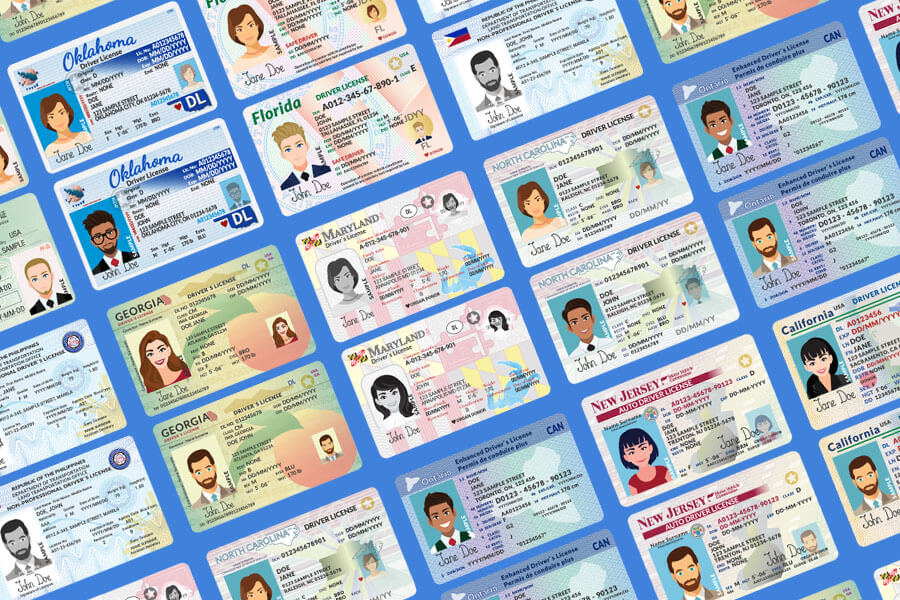
Notaries help prevent fraud every time they take a signer’s ID into hand to verify identity ... it’s the Notary’s #1 responsibility, and knowing your state’s laws will help when you come across a suspicious ID.
Notaries in all states are responsible for ensuring the identity of their signers and can be subject to civil or criminal liability if they fail to do so. Yet many states do not offer clear guidelines. Even in the states that do have identification requirements in the law, circumstances may arise that aren’t addressed.
To make matters more difficult, people often change their names and physical appearance, and many signers can’t produce any ID at all.
The key to ID conundrums comes down to following key practices that help you exercise sound judgment.
Know your state ID rules for notarization
The first rule for identifying signers is to know (and follow) your state guidelines. Some states specify by name the ID cards you can accept, but many other states just prescribe the elements in an acceptable ID and leave it to the Notary to determine if the identification presented meets requirements. Here are some examples of state ID guidelines:
California not only lists specific IDs CA Notaries may accept in its Notary laws but also requires the ID to be current or issued within the past five years. In addition, certain named IDs must contain a serial or identification number, a photograph and description of the person, and be signed by the bearer (Civ. Code 1185[b][3] and [4]).
Florida provides a list of acceptable IDs and requires these IDs to be current or issued within the past five years and include a serial or identifying number (F.S. 117.05[5][b]2).
Illinois permits Notaries to accept an identification document from a signer that is valid at the time of the notarization, issued by a state agency, federal government agency, or consulate and bears the photographic image of the individual’s face and signature of the individual (5 ILCS 312/6-102[d]).
Pennsylvania permits Notaries to accept a passport, driver’s license or government-issued nondriver identification card, which is current and unexpired. Notaries may also accept another form of government identification issued to an individual, which: (a) is current; (b) contains the signature or a photograph of the individual; and (c) is satisfactory to the notarial officer (57 Pa.C.S. 307(b)).
Texas requires an identification document presented by a signer to be issued by the federal government or any state government and contain the photograph and signature of the signer (Civ. Prac. & Rem. Code 121.005[a]). Texas Notaries may accept a current foreign passport as proof of signer identity when notarizing a deed or other instrument relating to a residential real estate transaction, but may not accept a foreign passport when notarizing any other types of documents (Civ. Prac. & Rem. Code 121.005[b][3]; 1 TAC 87.1[1]).
If your state offers no specific guidelines — and some don’t — the standard of professional care would be to request a current ID issued by the state or federal government that contains the signer’s photograph, physical description and signature. Examples of acceptable ID that typically have all of the above include:
- State driver’s license or non-driver’s ID;
- A passport;
- A federal ID, such as a military identification card;
- A state, county or local government ID; and
- A lawful permanent resident card otherwise referred to as a “green card.”
However, following state law or a general standard of care only goes so far, and there are still situations in which you’ll be asked to make a judgment call.
What if the identification photo doesn’t resemble the signer?
Notaries exist to prevent forgeries, but spotting fakes is not always easy. One of the warning signs that something’s amiss is when the photo and physical description on valid identification do not closely resemble the signer. This could indicate fraud, but there are other possible reasons: the ID may be expired, the signer's weight, hair color or hairstyle may have changed since the photo was taken, or the signer may have undergone cosmetic surgery or gender reassignment.
The first step is to examine the ID presented with a discerning eye and realize that every notarization presents an opportunity for forgery. If there’s any doubt, ask yourself these questions:
- Do I have reason to suspect the signer isn’t who they claim to be? In Florida and California, satisfactory evidence of identity means the absence of any information, evidence, or other circumstances that would lead a reasonable person to doubt the identity of the signer. This is a good practice everywhere. If you have reasonable suspicions, ask your signer for another form of state-approved ID. Also examine your state laws with regard to using a credible witness (or two, as required by some states).
- Have I taken all of the evidence on the ID into account? When making the final judgment call, take all the evidence on the card into account, not just the photo. Is the person’s height reasonably the same as on the ID? Eye color? Do all signatures match? If not, you may need to find an alternative way to identify the signer.
ID looks odd or somehow altered
Everything about the signer’s official, state-issued driver’s license may appear legitimate — but something still doesn’t seem right.
- Does the ID appear different than the standard format? While you can’t be expected to be an expert on all forms of ID, you should familiarize yourself with your own state’s IDs since you’ll likely encounter those most often. Learn to recognize security features such as embedded holograms, micro-printing and “ghost” photos. Security tools such as a small magnifying glass or blue UV light can help expose suspicious IDs.
- Has the ID been modified? While most driver’s licenses and state IDs are laminated, any additional lamination applied to the ID would be considered illegal tampering with or altering the license. In this case, or any other case involving tampering, it would no longer be an acceptable ID.
When the signer has no acceptable form of ID
According to a survey by the Brennan Center for Justice, millions of American citizens do not have government-issued forms of identification. Many tend to be poor, elderly or minorities. You may also confront the challenge of notarizing documents for a minor or a homeless person wholly lacking ID.
In cases where signers lack valid ID or you are unclear if an ID is acceptable, review your state requirements concerning the use of credible witnesses to identify signers.
Important facts about signer identification
- Temporary driver’s licenses, Social Security cards, birth or marriage certificates, credit cards or driver’s licenses without photographs are not generally considered acceptable and reliable forms of identification.
- Some states allow a grace period for expired licenses; be sure you know your state law before accepting an expired ID.
- In some states, jurats do not require an ID for notarization. Generally, copy certifications don’t require it either. Nevertheless, it is always a good idea to identify anyone who requests a notarial act.
- Civil or criminal liability for failure to appropriately identify a signer by satisfactory evidence can include hefty fines and/or a commission suspension or revocation.


Related Articles:
Notary guidelines for accepting or rejecting ID
The 3 ways Notaries can properly identify signers
Additional Resources:
NNA Hotline